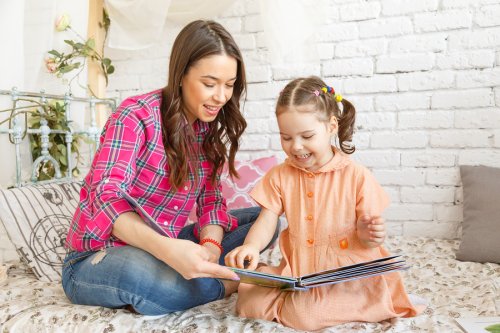4 Children's Stories About Friendship and Their Benefits

Stories about friendship indirectly teach children about important life values, and it also comes with a playful component. Therefore, you should instill an appreciation for reading in children from an early age.
Animated stories with fables and fantasies and characters of all ages are appealing to young children. Stories in which the main characters are animals are even more exciting.
All stories are useful, but must adapt to children’s age. Children cultivate new friendships and face new experiences throughout their entire lives. That’s why you can find stories about friendship for children and teenagers alike.
The best children’s stories about friendship
Cultivating love for others in a selfless way strengthens human relationships. For that reason, stories about friendship are ideal to encourage the value of such relationships with young children.
Looking Through the Window
This story is about a sick child who was isolated from others, and thus felt sad and discouraged.
However, a good friend took note of his feelings and stuck by his side, in a very unique way. It’s a story with a great lesson attached to it. This story shows that friends need to encourage and support each other in not only the good times, but the bad times as well.

The Two Friends
This is a short fable with a valuable lesson. It emphasizes the importance of moral values, and this shouldn’t be overlooked.
The Friendship Bag
This is a short story that shows children how they can seek good friends, which is a difficult feat for most people, since good friends are hard to come by.
The old man in the story reveals the secret of his friendship bag and how to value the love of the people that surround you. This story has been widely acclaimed by its readers, and it may interest your children too.
Augus and the Monsters
This is a series of funny stories about a very scatterbrained child and his monstrous friends. The style of the narration is direct and lively, so it catches the reader’s attention.
In addition, the author has cartoon illustrations throughout the book, which is ideal for young children. Exaggeration and humor predominate the series while teaching the value of friendship.
“Cultivating love for others in a selfless way strengthens human relationships.”
Benefits of children’s stories about friendship
Making friends is an essential part of children’s growth, and is also vital for their emotional and social development.
For example, friendships allow children to explore their own identity and to discover themselves. On the other hand, reading these types of stories enables them to manage current friendships and make new friends.
Through reading stories about friendship, children learn to value friends and cultivate good qualities that make them better people. For example, they understand the importance of being there for their friend, because many times friends are the ones who give support to overcome life’s obstacles.
For this reason, stories about friendship discuss the good and bad moments between friends. In this way, children can identify problems that arise in their friendships and seek possible solutions. This helps them properly maintain their self-esteem and be happier in the long run.

Questions related to reading the story
You should ask your children a series of questions that help them analyze the story better. Some suggestions are:
- Who are the characters and what are their qualities and virtues?
- Do they have a selfish or wrong attitude of what is good?
- What do you like most about the story?
- Which character do you identify with the most and why?
- How would you act in such a situation?
- What lesson have you learned?
When asking these questions, give your children time to think and respect their opinions. You can approach the discussion from a positive point of view, but with subtlety and cordiality.
In conclusion, children’s stories about friendship have a very valuable effect on young children. It encourages them not only to read, but to cultivate great friendships throughout their lives.
Stories about friendship indirectly teach children about important life values, and it also comes with a playful component. Therefore, you should instill an appreciation for reading in children from an early age.
Animated stories with fables and fantasies and characters of all ages are appealing to young children. Stories in which the main characters are animals are even more exciting.
All stories are useful, but must adapt to children’s age. Children cultivate new friendships and face new experiences throughout their entire lives. That’s why you can find stories about friendship for children and teenagers alike.
The best children’s stories about friendship
Cultivating love for others in a selfless way strengthens human relationships. For that reason, stories about friendship are ideal to encourage the value of such relationships with young children.
Looking Through the Window
This story is about a sick child who was isolated from others, and thus felt sad and discouraged.
However, a good friend took note of his feelings and stuck by his side, in a very unique way. It’s a story with a great lesson attached to it. This story shows that friends need to encourage and support each other in not only the good times, but the bad times as well.

The Two Friends
This is a short fable with a valuable lesson. It emphasizes the importance of moral values, and this shouldn’t be overlooked.
The Friendship Bag
This is a short story that shows children how they can seek good friends, which is a difficult feat for most people, since good friends are hard to come by.
The old man in the story reveals the secret of his friendship bag and how to value the love of the people that surround you. This story has been widely acclaimed by its readers, and it may interest your children too.
Augus and the Monsters
This is a series of funny stories about a very scatterbrained child and his monstrous friends. The style of the narration is direct and lively, so it catches the reader’s attention.
In addition, the author has cartoon illustrations throughout the book, which is ideal for young children. Exaggeration and humor predominate the series while teaching the value of friendship.
“Cultivating love for others in a selfless way strengthens human relationships.”
Benefits of children’s stories about friendship
Making friends is an essential part of children’s growth, and is also vital for their emotional and social development.
For example, friendships allow children to explore their own identity and to discover themselves. On the other hand, reading these types of stories enables them to manage current friendships and make new friends.
Through reading stories about friendship, children learn to value friends and cultivate good qualities that make them better people. For example, they understand the importance of being there for their friend, because many times friends are the ones who give support to overcome life’s obstacles.
For this reason, stories about friendship discuss the good and bad moments between friends. In this way, children can identify problems that arise in their friendships and seek possible solutions. This helps them properly maintain their self-esteem and be happier in the long run.

Questions related to reading the story
You should ask your children a series of questions that help them analyze the story better. Some suggestions are:
- Who are the characters and what are their qualities and virtues?
- Do they have a selfish or wrong attitude of what is good?
- What do you like most about the story?
- Which character do you identify with the most and why?
- How would you act in such a situation?
- What lesson have you learned?
When asking these questions, give your children time to think and respect their opinions. You can approach the discussion from a positive point of view, but with subtlety and cordiality.
In conclusion, children’s stories about friendship have a very valuable effect on young children. It encourages them not only to read, but to cultivate great friendships throughout their lives.
All cited sources were thoroughly reviewed by our team to ensure their quality, reliability, currency, and validity. The bibliography of this article was considered reliable and of academic or scientific accuracy.
- Bacete, F. J. G., Barreda, A. R., Rojas, I. M., & Perrin, G. M. (2013). El aprendizaje de la amistad en la Educación Primaria. Un procedimiento intensivo para ayudar a los niños rechazados a hacer amigos. Apuntes de Psicología, 31(2), 155-163. http://apuntesdepsicologia.es/index.php/revista/article/view/318
- Crimi, C. (2013). No necesito amigos. Obelisco.
- Grinovero, M., Rodriguez, L. M., Resett, S., & Moreno, J. E. (2014). Calidad de la amistad y autoevaluación en la niñez escolar. In VI Congreso Internacional de Investigación y Práctica Profesional en Psicología XXI Jornadas de Investigación Décimo Encuentro de Investigadores en Psicología del MERCOSUR. Facultad de Psicología-Universidad de Buenos Aires. https://www.aacademica.org/000-035/294
- Mallet, P. (2016). La amistad entre niños o adolescentes: una fuerza que ayuda a crecer (Vol. 143). Narcea Ediciones.
This text is provided for informational purposes only and does not replace consultation with a professional. If in doubt, consult your specialist.








